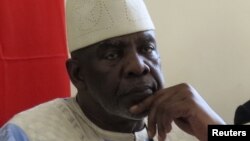An official of Mali’s interim government said radical Islamists who are in control of the country’s north have no place in a new national unity government.
The government, announced Monday, comprises 31 ministers, including five believed to be supporters of former coup leader Captain Amadou Sanogo. It replaces a transitional government created in April that was plagued by infighting.
Hamadoune Toure, Mali’s minister for communication and government spokesman, said all ministers of the new government had to subscribe to maintaining the territorial integrity of Mali and no Islamic values or Sharia law as the norm of government.
Toure said part of the new government’s mandate would be to liberate northern Mali from hardline Islamists. The new government replaces a transitional government created in April that was plagued by infighting.
“For a long time, we are asked to establish a government of national union to mobilize all political forces and civil society so that we can go for the north to re-establish our territorial integrity. So, the government was formed today [Monday], and it has to work on two aspects. The first one is the recuperation of the territorial integrity and the second aspect is to organize elections,” he said.
Toure downplayed suggestions that the new unity government included five members believed to be supporters of recent coup leader Captain Amadou Sanogo saying the ministers are chosen to work for the Malian government and people and not for an individual.
“Well, I don’t know how close they are to Captain Sanogo. If you are a minister, you work for the government and if you work for the government you work for the country. So, they are here to work for Mali, not for someone,” Toure said.
The Islamists in northern Mali have said they want to impose Sharia law, but Toure said hardline Islamists would not be welcome into the new unity government.
“To be a member of the government you need to accept two things: you don’t accept partition and you don’t express Islamist values to be as a state in Mali. So, those are the two values we have,” he said.
The Economic Community of West African States (ECOWAS) wants to deploy a 3,000-member force to Mali, but one key holdup has been the lack of a united Toure said the new national unity government should make it easier for ECOWAS troops to be deployed.
“The government has two priorities - re-establish the territorial integrity of Mali in the north, and the second priority is organizing elections. The government will start working as soon as possible and try to get support from ECOWAS, from the African Union and from the United Nations,” Toure said.
The government, announced Monday, comprises 31 ministers, including five believed to be supporters of former coup leader Captain Amadou Sanogo. It replaces a transitional government created in April that was plagued by infighting.
Hamadoune Toure, Mali’s minister for communication and government spokesman, said all ministers of the new government had to subscribe to maintaining the territorial integrity of Mali and no Islamic values or Sharia law as the norm of government.
Toure said part of the new government’s mandate would be to liberate northern Mali from hardline Islamists. The new government replaces a transitional government created in April that was plagued by infighting.
“For a long time, we are asked to establish a government of national union to mobilize all political forces and civil society so that we can go for the north to re-establish our territorial integrity. So, the government was formed today [Monday], and it has to work on two aspects. The first one is the recuperation of the territorial integrity and the second aspect is to organize elections,” he said.
Toure downplayed suggestions that the new unity government included five members believed to be supporters of recent coup leader Captain Amadou Sanogo saying the ministers are chosen to work for the Malian government and people and not for an individual.
“Well, I don’t know how close they are to Captain Sanogo. If you are a minister, you work for the government and if you work for the government you work for the country. So, they are here to work for Mali, not for someone,” Toure said.
The Islamists in northern Mali have said they want to impose Sharia law, but Toure said hardline Islamists would not be welcome into the new unity government.
“To be a member of the government you need to accept two things: you don’t accept partition and you don’t express Islamist values to be as a state in Mali. So, those are the two values we have,” he said.
The Economic Community of West African States (ECOWAS) wants to deploy a 3,000-member force to Mali, but one key holdup has been the lack of a united Toure said the new national unity government should make it easier for ECOWAS troops to be deployed.
“The government has two priorities - re-establish the territorial integrity of Mali in the north, and the second priority is organizing elections. The government will start working as soon as possible and try to get support from ECOWAS, from the African Union and from the United Nations,” Toure said.












